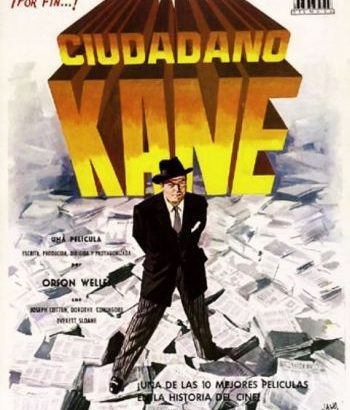
CINE FORO SOBRE CINE AMERICANO – ASPECTOS A CONSIDERAR DURANTE LA VISUALIZACIÓN DE LA PELÍCULA PARA EL POSTERIOR DEBATE: CIUDADANO KANE
“Ciudadano Kane” es un caso extraordinario en la historia del cine, a escala mundial, por múltiples razones. Tanto es así, que en general sale elegida como la mejor película de la historia en todas las encuestas, por delante incluso de todas las que Orson Welles realizó después.
Resulta extraordinaria, ante todo, por la deslumbrante madurez artística y humana que revela en alguien que antes jamás había trabajado en el cine, solo en la radio y el teatro, donde había sobresalido, y que contaba únicamente con 26 años de edad. Así, por el lado “artístico” reinventa el lenguaje cinematográfico, aunando de modo particular influencias muy diversas, del cine mudo alemán a los pioneros americanos, y valorando en especial la elocuencia de los movimientos de cámara en planos largos y los efectos dramáticos de los encuadres y la profundidad de campo, y por el lado “humano” ofrece una reflexión sobre la decrepitud, el fracaso y las decepciones de enorme eficacia. Empero, aglutinando los registros más diversos: social, moral, psicológico, poético, tierno, humorístico, dramático…
Inventa también el estilo de película-encuesta, ordenada sin criterios cartesianas y donde la verdad, siempre hipotética, se ilumina desde diferentes perspectivas y tiempos narrativos.
El personaje de Kane se inspira un tanto en el magnate de la prensa William Randolph Hearst, quien hizo todo lo posible para impedir la distribución de la película, incluso intentó comprarla y destruirla a los distribuidores-productores, RKO.
El estreno, celebrado en Nueva York el 1 de Mayo de 1941, despertó una gran expectación, y la película de inmediato fue reconocida como una obra excepcional y deslumbrante, fruto de un genio que aglutinó funciones: protagonismo, director, productor y coguionista. En cambio, comercialmente fracasó en gran medida. A partir de entonces, Welles no dejaría de trabajar en el cine, tanto en América como en Europa, compaginando nuevas películas como director, también con él dentro del reparto salvo en El cuarto mandamiento (The Magnificent Ambersons), con trabajos de actor en películas de todo tipo y nacionalidad, de forma siempre brillante.
Estuvo prohibida en España hasta comienzos de los años 60, debido a su marcada cualidad americana y liberal, en unos decenios en que Estados Unidos se mostró enemiga de la dictadura franquista.
Anita Haas.
Proyección de la película “Citizen Kan” (1941/119 min. – 2 horas) en V.O.S.E. seguido de coloquio sobre la misma el 26 de febrero. Proyección: a las 18:30 h. / Coloquio: a las 20:30 h.



